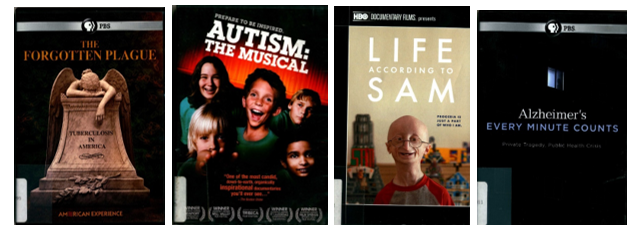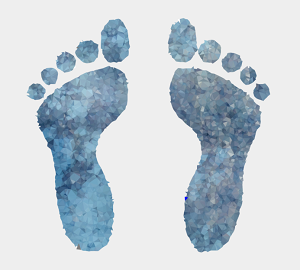
Part I of Marvelous Us! got us started on an exploration of the human body by examining some recent titles added to the library’s collection. The subject is so large and rich that we need three parts to cover our recent acquisitions on the topic. In Part I we looked at our skin, microbes, bacteria, hearts, blood, transplantation, and an overview of the human body.
Now we come to hormones in the book Aroused: the history of hormones and how they control just about everything. This book is “a fascinating look at the history and science of some of medicine's most important discoveries, Aroused reveals the shocking history of hormones through the back rooms, basements, and labs where endocrinology began." In Pleased to meet me: genes, germs, and the curious forces that make us who we are author Bill Sullivan thinks that: “The foods we enjoy, the people we love, the emotions we feel, and the beliefs we hold can all be traced back to our DNA, germs, and environment.” See if you agree. Three recent titles warn women that they are not well represented in many medical studies. Diagnosis female: how medical bias endangers women's health, Sex matters: how male-centric medicine endangers women's health and what we can do about it and Doing harm: the truth about how bad medicine and lazy science leave women dismissed, misdiagnosed, and sick explain this situation.
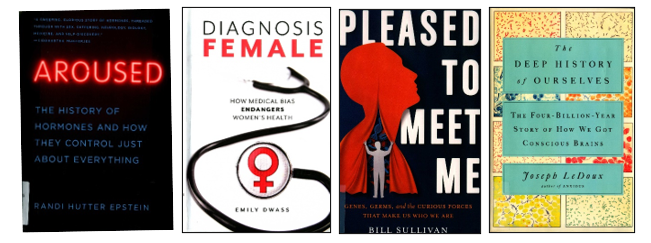
One of the reasons Marvelous Us! needs three parts to cover the human body is because of our brains. We acquire books all the time with the latest science on the human brain. There is still much we do not know about how the brain works but here are some current titles to bring you up to date on where the research is. For an overview try: How the Brain Works: The Facts Visually Explained, or Understanding the brain: from cells to behavior to cognition or The consciousness instinct: unraveling the mystery of how the brain makes the mind, or The deep history of ourselves: the four-billion-year story of how we got conscious brains. Then we have books on specific brain issues. Shaken brain: the science, care, and treatment of concussion was published in 2020 making it a current resource with the latest research. Autism is another brain-related subject for which we frequently add titles. The boy who felt too much: how a renowned neuroscientist and his son changed our image of autism forever is a personal account of how a parent has impacted science. The autistic brain: helping different kinds of minds succeed offers help on raising and educating children on the autism spectrum. Published in 2020, Is it Alzheimer's?: 101 answers to your most pressing questions about memory loss and dementia provides the latest research on this topic.
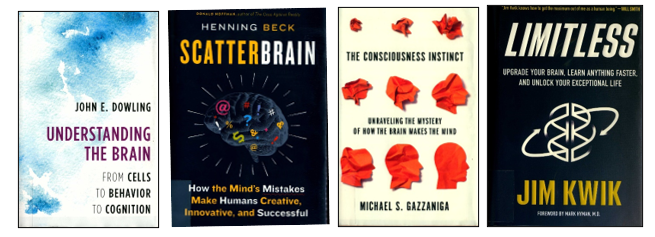
There some light-hearted books involving the brain. In Scatterbrain : how the mind's mistakes make humans creative, innovative, and successful, “neuroscientist Henning Beck’s hilarious asides and brain-boosting advice make for delightful reading of the most cutting-edge neuroscience our brains will (maybe never) remember.” In Limitless: upgrade your brain, learn anything faster, and unlock your exceptional life by Jim Kwik (described as “the world’s #1 brain coach”) he has constructed an “owner’s manual for mental expansion and brain fitness.”
We have DVDs on many of the same subjects found in our books. They will be shelved using the same numbering system as the non-fiction books. Documentaries such as Life according to Sam, Autism: the musical, Alzheimer’s every minute counts and The forgotten plague tell compelling stories in a visual format further enhancing your reading experience.
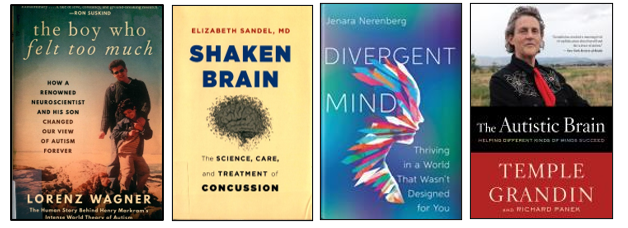
All the books mentioned in this blog were featured in the Nature & Science newsletter. You can look at previous issues of newsletters here and sign up for the Nature & Science Newsletter here. The Nature & Science Newsletter features new titles added to the library’s collection and is emailed to you every two months.
